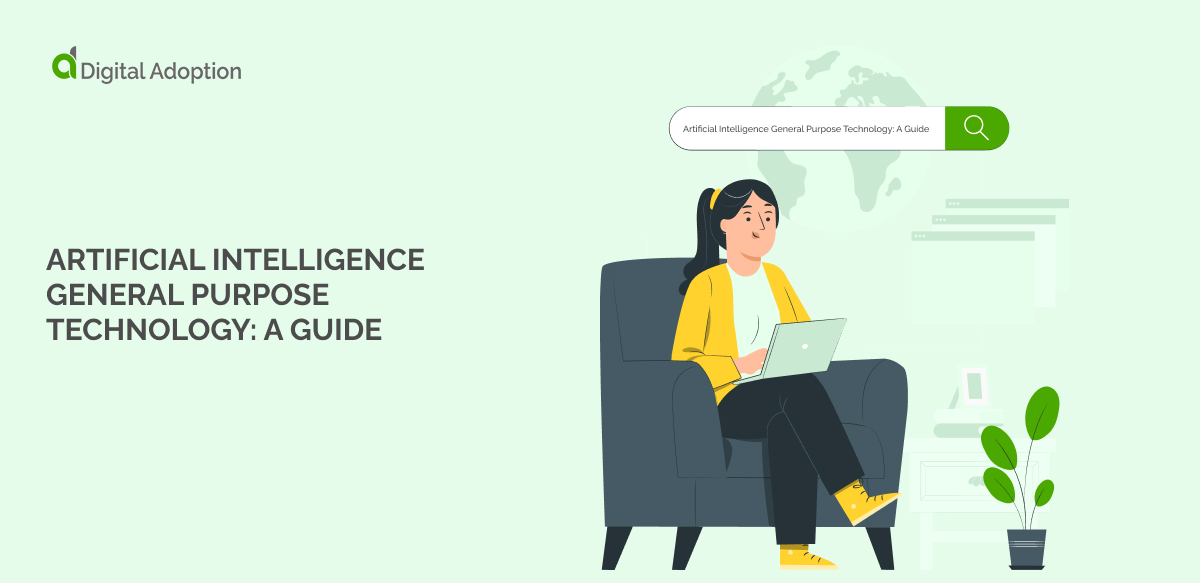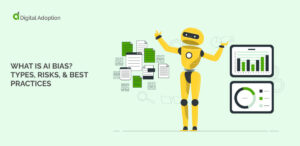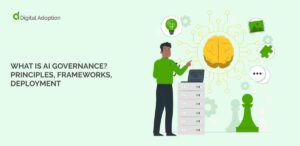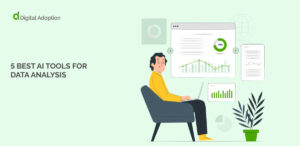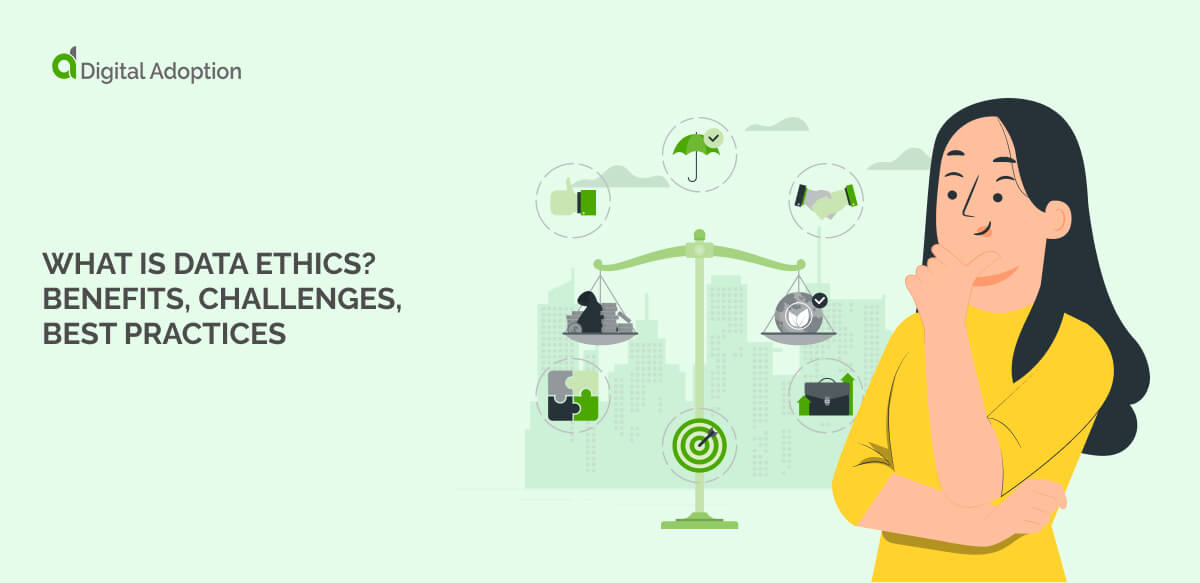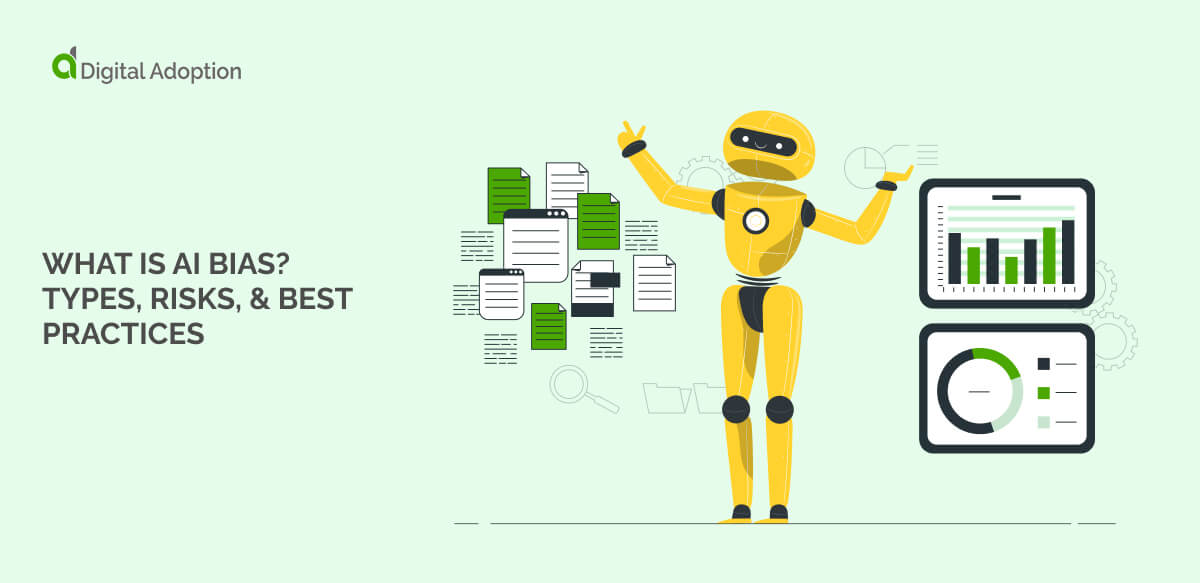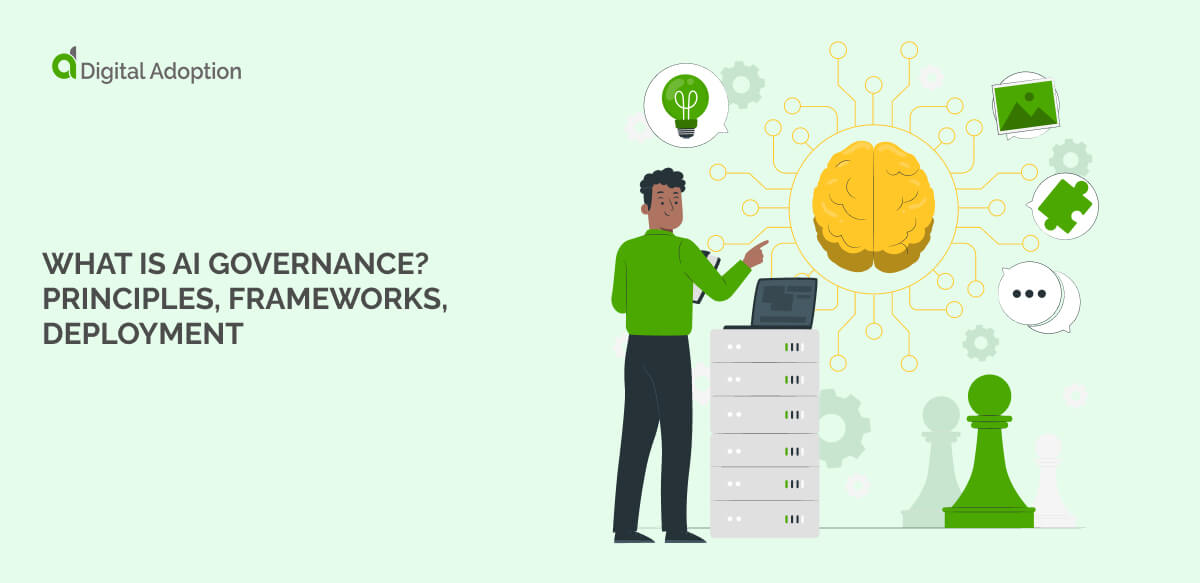However you feel about generative AI (gen AI), it is one of the most disruptive technological innovations since steam power and the internal combustion engine.
To broaden this technology out to AI, we can see how AI technology is a general-purpose technology because, like the invention of the steam engine, electricity, and computers, it has dramatically changed how we live and do business, and has led to drastic economic growth.
AI GPT is a valuable market, as it will likely reach a market value of USD 126 billion by 2025. So now is the time to prepare for investment into artificial intelligence general purpose technology (AI GPT).
To help you understand artificial intelligence general-purpose technology, we will discuss the following topics:
- What is a general purpose technology (GPT)?
- What is artificial intelligence general purpose technology (AI GPT)?
- How AI GPT is different from other technologies
- Use cases for general-purpose technology
- Best practices for AI GPT
- What is a General Purpose Technology (GPT)?
- What is Artificial Intelligence General Purpose Technology (AI GPT)?
- How is AI GPT Different from Other Technologies?
- Use Cases for AI General-purpose Technology
- Best Practices for AI GPT
- Understand Artificial Intelligence General Purpose Technology Before Investing
What is a General Purpose Technology (GPT)?
A general purpose technology, also called GPT, and not to be confused with ChatGPT, which stands for generative pre-trained transformer, is any technology significantly disruptive to an economy or industry so that it functions differently from before.
Usually, technological progress creates adverse effects (such as how generative AI may lead to a reduction in roles) before leading to productivity gains, like an increase in revenue and the creation of new roles.
General-purpose Technology Examples
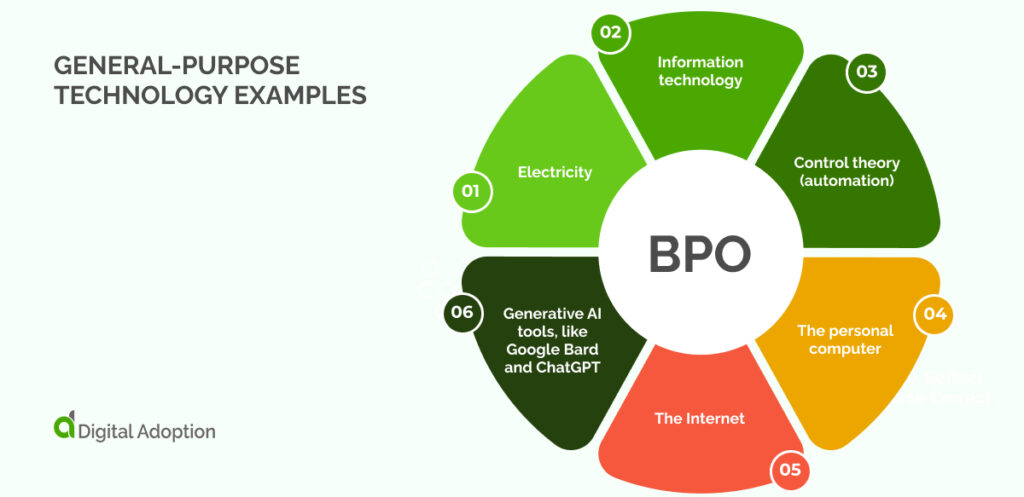
There have been many examples of GPTs, which led us to AI general-purpose technology and its development over time. Some of the best examples of GPTs include:
- Electricity
- Information technology
- Control theory (automation)
- The personal computer
- The Internet
- Generative AI tools, like Google Bard and ChatGPT
By knowing these previous forms of general-purpose technology, we can further understand AI GPT.
What is Artificial Intelligence General Purpose Technology (AI GPT)?
Artificial intelligence general purpose technology (AI GPT) is a technology that disrupts the economy and the business world because of how many business processes it changes in enterprises.
Examples include:
- Deep learning and complementary innovations
- Natural language processing (NLP) machine learning
- Generative pre-trained transformers
These examples influence diverse sectors, from healthcare and education to enterprise automation.
How is AI GPT Different from Other Technologies?
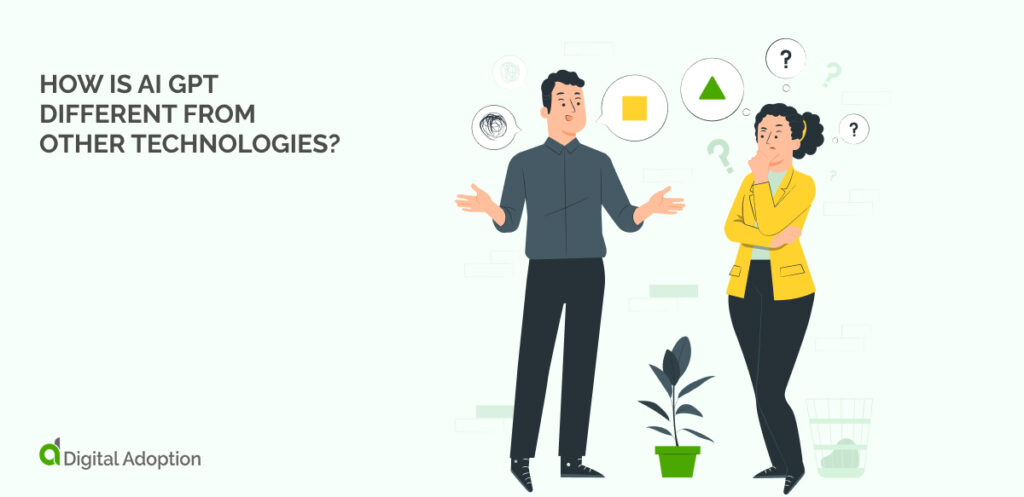
Artificial Intelligence General-Purpose Technology (AI GPT) distinguishes itself from other technologies in its versatility and broad applicability.
While many technologies serve specific functions or industries, AI GPT can transcend these boundaries, impacting various sectors simultaneously as it combines characteristics from other types of technologies, such as disruptive and emerging technologies.
However, its capacity to adapt, learn, and perform diverse tasks sets it apart, making it a transformative force across multiple domains and a disruptive and emerging technology.
Unlike specialized technologies, general-purpose AI systems possess the flexibility to address a wide range of challenges, making them a robust and influential tool in today’s technological landscape.
Use Cases for AI General-purpose Technology
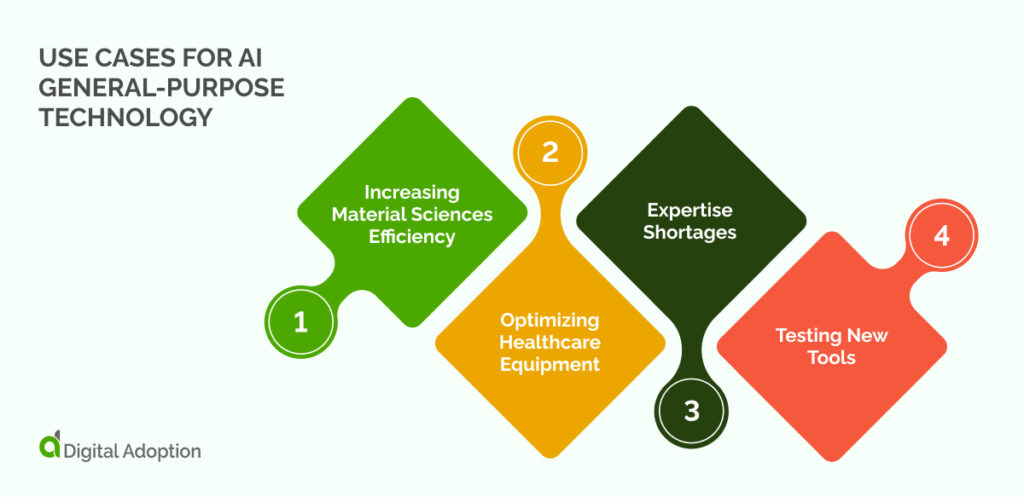
AI GPT has many different use cases in diverse industries, as it helps increase efficiency and solve many business challenges.
Investments in generative AI solutions passed USD 1.7 billion in 2022 and continue to grow as more industries see how they can benefit from an AI digital transformation.
Increasing Material Sciences Efficiency
Generative AI is revolutionizing the automotive, aerospace, defense, medical, electronics, and energy industries by creating new materials with precise physical attributes.
In the process known as inverse design, outlines desired properties and identifies materials likely to exhibit them, eliminating the reliance on chance discoveries.
This approach leads to the discovery of materials with improved conductivity, magnetic attraction, or corrosion resistance, particularly in energy and transportation applications.
Optimizing Healthcare Equipment
AI possesses the capability to diagnose diseases through the analysis of medical images and CT scans, including X-rays and MRIs.
The algorithm can learn from extensive datasets to discern patterns linked to specific illnesses. For instance, it can identify lung cancer from CT scans or diagnose skin cancer by recognizing patterns in a dataset of skin images.
Expertise Shortages
Facing a shortage of workers with AI expertise, businesses often seek external assistance. IBM’s Data Science and AI Elite team, comprising nearly one hundred data scientists, plays a crucial role in addressing tech skill gaps and navigating the challenges of AI adoption.
Over the past three years, the team has successfully executed projects in 50 countries, aiding clients in diverse endeavors, including reducing beach litter, optimizing a telecom company’s operating costs by 15%, and proactively addressing bias in hiring processes.
Testing New Tools
Collaborating with IBM and utilizing its cloud computing services, Lufthansa transitioned from AI proofs-of-concept to scaling data science projects throughout the organization.
The airline established a dedicated computing platform, allowing its data scientists to experiment and test AI initiatives before implementing them company-wide.
Best Practices for AI GPT
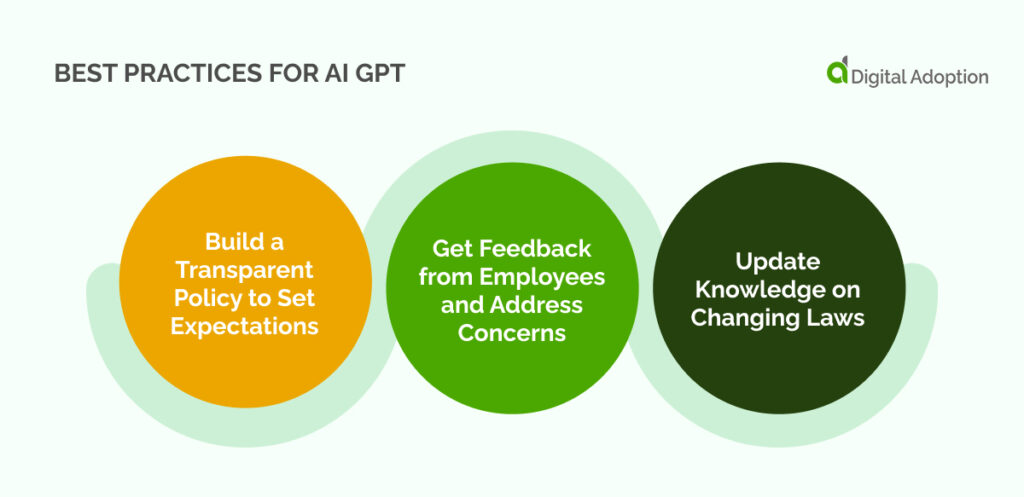
Before jumping straight into AI GPT implementation, it’s helpful to consider best practices, as these will help your staff feel valued, maintain governance, and ensure everyone meets expectations.
Build a Transparent Policy to Set Expectations
Establishing a transparent policy is essential for managing expectations around workplace practices.
Clearly defined guidelines foster a positive work environment, reducing uncertainties and promoting trust between employees and management.
Ensure you include an AI-acceptable use policy to clarify how employees can use AI tools to improve security as part of AI risk management practices.
Get Feedback from Employees and Address Concerns
Employee feedback is invaluable for maintaining a healthy workplace, especially regarding disruptive technologies like AI, which can create fear and uncertainty of job losses.
Regularly seeking input and promptly addressing concerns demonstrates a commitment to employee well-being, boosting morale, fostering a collaborative and supportive work culture, and promoting AI’s benefits for efficiency and productivity.
Update Knowledge on Changing Laws
Staying informed about evolving laws and regulations is crucial for legal compliance, as the EU has already made recommendations for AI regulation but these will change over time and the US will formulate its own regulation which may vary for each state.
Regular updating knowledge ensures that the organization operates within the legal framework, mitigating risks and promoting a culture of responsibility and accountability in adapting to the dynamic legal landscape.
Understand Artificial Intelligence General Purpose Technology Before Investing
Before investing in Artificial Intelligence General-Purpose Technology (AI GPT), it’s crucial to comprehend its distinctiveness.
Unlike specialized technologies like machine learning systems, AI GPT exhibits versatility, impacting diverse sectors simultaneously. Its adaptive learning abilities and broad applicability make it a transformative force.
Understanding its unique features ensures informed investment decisions, recognizing its potential to revolutionize various industries and contribute to technological advancements on a wide scale.

